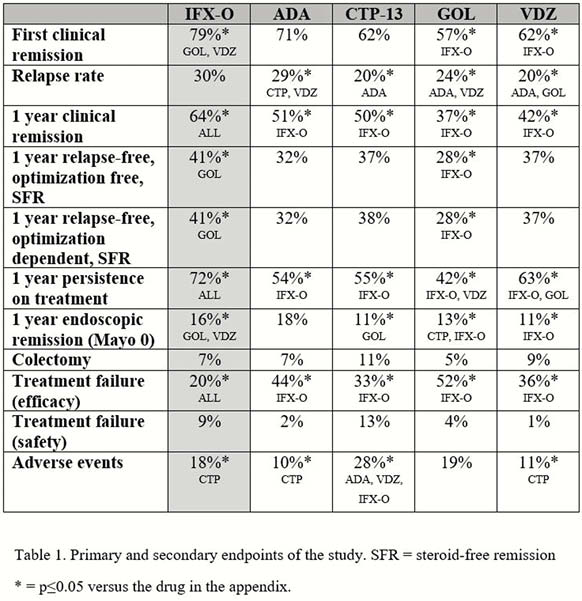P566 Assessing the efficacy of biologics in ulcerative colitis: A real-life, observational retrospective multicenter study using the propensity score analysis: The ‘A.U.R.O.R.A.’ comparison study
A. Cassinotti1, N. Mezzina1, D. Di Paolo2, M.V. Lenti3, C. Bezzio4, D. Stradella5, M. Mauri6, V. Zadro1, C. Cortellezzi7, C. Ricci8, V. Casini9, E. Radice10, A. Massari1, S. Ardizzone1, L. Pastorelli2, A. Di Sabatino3, G. Manes4, F. Caprioli11, M. Vecchi11, R. Tari5, P. Occhipinti5, M. Fichera6, P. Invernizzi6, M. Parravicini7, S. Segato7, F. Pace9, P.A. Testoni10, C. Tinelli12, A. De Silvestri12
1Department of Gastroenterology, Luigi Sacco University Hospital, Milan, Italy, 2Gastroenterology and Digestive Endoscopy Unit, IRCCS Policlinico San Donato, San Donato Milanese, Milano, Italy, 3Istituto di Ricovero e Cura a Carattere Scientifico San Matteo Hospital Foundation, University of Pavia, First Department of Medicine, Pavia, Italy, 4ASST Rhodense, Rho and Garbagnate Milanese Hospital, Department of Gastroenterology, Milan, Italy, 5Department of Gastroenterology, ‘Maggiore Della Carità’ Hospital- Novara, Novara, Italy, 6Gastroenterology Division, San Gerardo Hospital- ASST Monza, Monza, Italy, 7Division of Gastroenterology, ASST Sette Laghi, Ospedale di Circolo Fondazione Macchi, Varese, Italy, 8Spedali Civili and University of Brescia, Gastroenterology Section, 1st Medical Clinic, Brescia, Italy, 9Department of Gastroenterology, ASST Bergamo EST-Ospedale Bolognini, Bergamo, Italy, 10Gastroenterology Unit, IRCCS San Raffaele Scientific Institute, Milano, Italy, 11Department of Gastroenterology and Endoscopy, IRCCS Ca’ Granda Foundation, University of Milan, Milano, Italy, 12Fondazione IRCCS Policlinico san Matteo, Servizio di Epidemiologia Clinica e Biometria Direzione Scientifica, Pavia, Italy
Background
Until 2014, infliximab originator (Remicade, IFX-O) was the only biological treatment approved in Italy for ulcerative colitis (UC), followed by the sequential approval of adalimumab (ADA), infliximab biosimilar (CTP-13), golimumab (GOL) and vedolizumab (VDZ). Recently, comparative trials among these drugs provided conflicting results on their reciprocal superiority or equivalence.
Methods
In a retrospective, real-life, multicenter inception cohort study involving 11 Italian IBD tertiary centres, all consecutive patients with moderate-to-severe active UC, treated with ADA, CTP-13, GOL or VDZ after their post-marketing approval (2014–2018) were followed-up for 1 year or until relapse. All drugs were compared with each other and to patients treated with Remicade in 2013–2014 (reference group). The 80% power calculation of the study required at least 75 patients in each arm. A propensity score analysis was performed. The primary endpoint was the 1 year relapse-free, optimisation-free, steroid-free remission, defined as Mayo partial score ≤2, with bleeding subscore = 0, no relapse after first clinical remission and no optimisation with dose intensification or steroids courses. Multiple further secondary endpoints were analysed (Table 1).
Results
492 patients (ADA=90, CTP-13=105, GOL=79, VDZ=142, IFX-O=76) were included. Overall, 65% achieved clinical remission once during the follow-up, with IFX-O performing better than GOL and VDZ. The relapse rate was 24%, with the lowest rates with VDZ. The primary end-point was achieved in similar percentages in all groups, except for lower rates with GOL than IFX-O. IFX-O performed better than each other drug for other clinical outcomes (Table 1). Discontinuation for intolerance was similar among the drugs, but CTP-13 had more frequent adverse events (mainly infusion reactions) than ADA, VDZ and IFX-O.

Conclusion
Based on a strict definition of clinical remission, all biologics appear equally effective at 1 year, except for GOL vs. IFX originator. IFX-O appears more effective in multiple questionable clinical outcomes. IFX biosimilar had more adverse events than the other drugs. IFX originator should be used as the reference drug in head to head, controlled, comparison trials for current and future biologics in UC.


